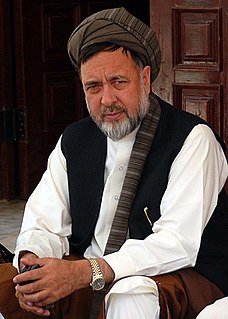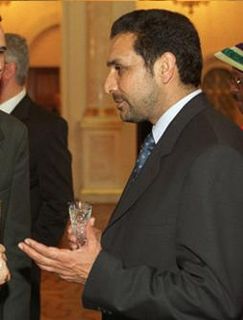Related Research Articles

Burhānuddīn Rabbānī was an Afghan politician and teacher who served as President of Afghanistan from 1992 to 2001.

Hamid Karzai is an Afghan politician who served as President of Afghanistan from 22 December 2001 to 29 September 2014. He is also the leader of the Popalzai Durrani tribe of Kandahar.

Gul Agha Sherzai, also known as Mohammad Shafiq, is a politician in Afghanistan. He is the former governor of Nangarhar province in eastern Afghanistan. He previously served as Governor of Kandahar province, in the early 1990s and from 2001 until 2003. In October 2013, Sherzai resigned from his post as governor and formally announced himself as a candidate for Afghanistan's 2014 Presidential Election. He is presently the minister of border and tribal affairs.

Mohammad Ashraf Ghani Ahmadzai is an Afghan politician, academic, and economist who served as President of Afghanistan between September 2014 and August 2021.

Ahmed Wali Karzai was a politician in Afghanistan who served as Chairman of the Kandahar Provincial Council from 2005 until his death. He was the younger paternal half-brother of former Afghan President Hamid Karzai and an elder of the Popalzai tribe. Wali Karzai formerly lived in the United States, where he managed a restaurant owned by his family. He returned to Afghanistan following the removal of the Taliban government in late 2001. He has been accused of political corruption and was allegedly on the CIA payroll. He was assassinated by one of his close bodyguards, Sardar Mohammad, on 12 July 2011.
The Shinwari is an ethnic Pashtun tribe of Afghanistan and KPK. Among the famous Cricketers of Afghanistan are Rashid Khan and Samiullah Shinwari The Shinwari tribe is son of Kasi Pashtun tribe settled in the eastern disctricts of Nangarhar Province, in Haska Meyna, Achin, Rodat, Bati Kot, Kot, Chaprahar, Shinwar, Dor Baba and Nazian districts. A major portion of the tribe is centered in Jalalabad City of Afghanistan. These Shinwaris are mostly traders and businessmen. The Shinwari are also located in Kunar, Parwan, Kabul, Kunduz and Balkh Province. Reporting from 2010 states that there are around 400,000 Shinwari in Afghanistan.Most of the Shinwaries are migrated to Pakistan and settled in Landikotal, swat. The sub cast of Shinwari i.e Mirdad khel are settled in Swat region since 1935.

Spin Boldak is a border town and the headquarters of Spin Boldak District in the southern Kandahar province of Afghanistan, next to the border with Pakistan. It is linked by a highway with the city of Kandahar to the north, and with Chaman and Quetta in Pakistan to the south. Spin Boldak has the second major port of entry between Afghanistan and Pakistan, the Wesh-Chaman border crossing. It is also a major transporting, shipping and receiving site between the two neighboring countries.

Haji Muhammad Mohaqiq is a current politician in Afghanistan, serving as a member of the Afghanistan Parliament. He is also the founder and chairman of the People's Islamic Unity Party of Afghanistan. During the 1980s, he served with the mujahideen rebel forces fighting against the Soviet-backed Afghan government. After the withdrawal of the Soviet Union in 1989, Mohaqiq was appointed as the leader of the Hezb-e Wahdat for northern Afghanistan.

The Northern Alliance, officially known as the United Islamic National Front for the Salvation of Afghanistan, was a military alliance of rebel groups that operated between late 1996 to 2001 after the Islamic Emirate of Afghanistan (Taliban) took over Kabul. The United Front was originally assembled by key leaders of the Islamic State of Afghanistan, particularly president Burhanuddin Rabbani and former Defense Minister Ahmad Shah Massoud. Initially it included mostly Tajiks but by 2000, leaders of other ethnic groups had joined the Northern Alliance. This included Karim Khalili, Abdul Rashid Dostum, Abdullah Abdullah, Mohammad Mohaqiq, Abdul Qadir, Asif Mohseni, Amrullah Saleh and others.

The Hezb-e-Islami Gulbuddin, also referred to as Hezb-e-Islami or Hezb-i-Islami Afghanistan (HIA), is an Afghan political party and former militia, founded and led by Gulbuddin Hekmatyar.

Haji Abdul Qadeer was a prominent Northern Alliance leader in Afghanistan and opposed the Taliban. Originally a commander of the Hezb-i Islami Khalis faction during the Soviet–Afghan War, he then served as governor of Nangarhar Province, the head of the Eastern Afghanistan Shura, and later Vice President of Afghanistan and Minister of Public Works in the administration of Hamid Karzai from 19 June 2002 until his assassination on 6 July 2002. He was the older brother of fellow anti-Soviet and Northern Alliance commander Abdul Haq, who was executed in late 2001 by the Taliban.

Ahmad Zia Massoud is an Afghan politician who was the Vice President of Afghanistan in the first elected administration of President Hamid Karzai, from December 2004 to November 2009. He is a younger brother of the late Ahmad Shah Massoud, the resistance leader against the Soviet invasion of Afghanistan and against the Taliban. In late 2011, Ahmad Zia Massoud joined hands with major leaders in the National Front of Afghanistan, which strongly opposes a return of the Taliban to power. The National Front is generally regarded as a reformation of the United Front which with U.S. air support removed the Taliban from power in late 2001.
Hajji Mohammed Zaman was a Pashtun Afghan military leader and politician. He was an ethnic Pashtun, connected to the Khogyani tribe. According to Maj. Dalton Fury, who fought together with Ghamsharik in November/December 2001 in the Tora Bora campaign against the Taliban, Haji Zaman had been "one of the more infamous mujahideen junior commanders during the Soviet–Afghan War. When the Taliban took over, Zaman departed Afghanistan for France. When the Taliban fell from grace after 9/11, he returned to his homeland to reclaim his former VIP status. He was said to have influential friends within neighboring Pakistan, including members of the Pakistan intelligence service. He reportedly led a force of 4,000 men during the campaign to oust Afghanistan's Soviet occupiers.

Asadullah Khalid is a politician in Afghanistan. He served as head of the National Directorate of Security (NDS), which is the domestic intelligence agency of Afghanistan. Before his appointment as the head of the NDS in September 2012, Khalid served as the Minister of Tribal and Border Affairs. Between 2005 and 2008, he was the Governor of Kandahar Province and prior to that as Governor of Ghazni Province (2002-2005). From 2018 until 2021 he was the Minister of Defense. Khalid is said to be affiliated with the Islamic Dawah Organisation of Afghanistan and has been noted as one of many loyalists of Afghan President Hamid Karzai.
Gulan was an anti-Taliban militia leader, prior to the ouster of the Taliban. He was a member of a local anti-Taliban provisional administration that rose to power in Eastern Afghanistan, centred in Jalalabad, Nangarhar, before Hamid Karzai had assembled his nationwide provisional administration.
Haji Abdul Zahir Qadeer is a member of parliament in Afghanistan. He used to be a General in Afghanistan's Border Guard.
The Haqqani network is an Afghan guerrilla insurgent group that used asymmetric warfare to fight against US-led NATO forces and the Islamic Republic of Afghanistan. Jalaluddin Haqqani and his son Sirajuddin Haqqani have led the group. It is an offshoot of the Taliban.

Abdullah Abdullah is an Afghan politician who led the High Council for National Reconciliation (HCNR), which was expected to lead the intra-Afghan peace talks with the Taliban, from 2020 to 2021. He served as Chief Executive of Afghanistan from September 2014 to March 2020 and as Minister of Foreign Affairs from December 2001 to April 2005. Prior to that he was a senior member of the Northern Alliance, working as an adviser to Ahmad Shah Massoud. He worked as an ophthalmologist and medical doctor in the 1980s.

The Karzai administration was the government of Afghanistan under President Hamid Karzai, who became the head of state of Afghanistan in December 2001 after the Taliban government was overthrown. Karzai was appointed at the 2002 Loya Jirga as the Interim President of the Afghan Transitional Administration. After the 2004 Afghan presidential election, he became the President of Afghanistan.
Events from the year 2010 in Afghanistan.